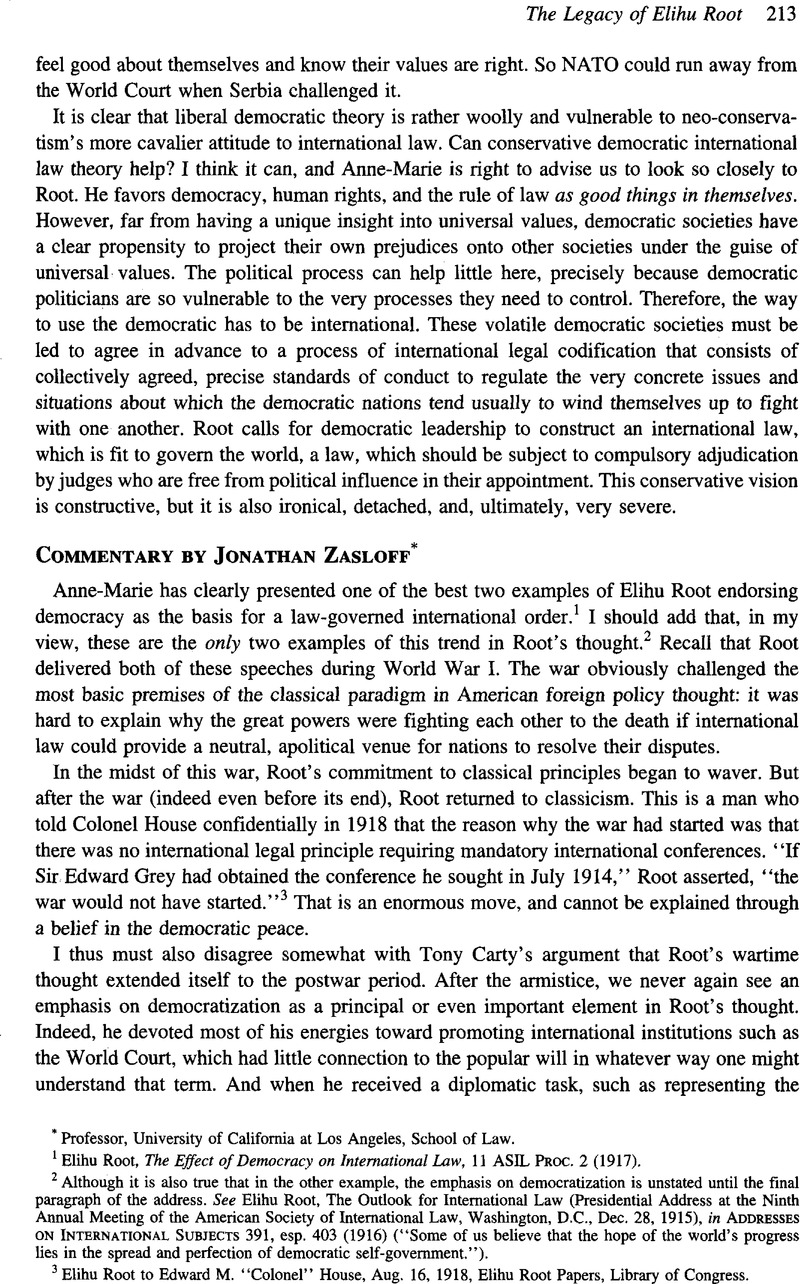No CrossRef data available.
Published online by Cambridge University Press: 28 February 2017

1 Root, Elihu, The Effect of Democracy on International Law, 11 ASIL Proc. 2 (1917)Google Scholar.
2 Although it is also trae that in the other example, the emphasis on democratization is unstated until the final paragraph of the address. See Elihu Root, The Outlook for International Law (Presidential Address at the Ninth Annual Meeting of the American Society of International Law, Washington, D.C., Dec. 28, 1915), in Addresses on International Subjects 391, esp. 403 (1916) (“Some of us believe that the hope of the world’s progress lies in the spread and perfection of democratic self-government.”).
3 Elihu Root to Edward M. “Colonel” House, Aug. 16, 1918, Elihu Root Papers, Library of Congress.
4 The racial basis of this concept should be apparent, although Root’s respect for Japan and China should make it clear that he was no crude racist. He also worked closely with Latin American nations and took seriously the idea that they were full and equal members of the international community. Indeed, he was the first secretary of state to travel outside the United States during his term of office, making a highly successful goodwill trip to Argentina, Brazil, and Chile. Thus, while “civilization” has racial overtones, it was not a proxy for racial prejudice, and in fact broke down intercultural barriers.
5 See Fareed Zakaria, The Future of Freedom: Illiberal Democracy At Home and Abroad (2003).
6 Donald L. Horowitz, Ethnic Groups in Conflict 86 (1985).
7 Richard Leopold’s assessment is judicious and accurate: “Stability, cleanliness, good roads, new schools, economic benefits, and responsible governors—these things the insular possessions received from Root in abundance. But representative institutions were granted sparingly, and the promise of freedom was absent.” Richard W. Leopold, Elihu Root and the Conservative Tradition 38 (1954).
8 It is instructive that Anne-Marie relies on Tom Tyler’s justifiably praised work for a theory of obedience to international law. But Tyler does not argue that the perceived legitimacy of legal institutions is sufficient for social order. Tyler based his study on a poll of people in Chicago, which despite some rough spots, is a law-abiding, stable American city under the control of state authority. Put another way, the world is anarchical: Chicago is not. and while Chicago is a city of great diversity, it does not compare to the wide variety of interests and values in nations throughout the globe. Tyler did not apply his findings to international life. There is a reason for this.
9 See Philip C. Jessup, 2 Elihu Root 377 (1938).
10 My colleague Marc Trachtenberg emphasizes that French officials wanted early on to cooperate with Germany and achieve greater integration of the two nations’ economies. See generally Marc Trachtenberg, Reparation in World Politics: France and European Economic Diplomacy, 1916-1923 (1980). But he acknowledges that “reparation was always far more a political than an economic problem.” Id. at 342. Although Paris was not trying to crush Germany with reparations payments, it insisted on fulfillment of the terms of the Versailles Treaty: opening up the Versailles settlement raised the specter of abandoning the German disarmament clauses that stood as France’s central protection. Cooperative arrangements could be implemented, French officials believed, but only in the context of an overall political settlement that guaranteed French security. See id. at 171-72. The failure to achieve this settlement doomed the cooperative effort. But this should hardly be surprising in light of the imbalance of power. After all, as Trachtenberg observes, “One inescapable fact dominated the French vision of international politics: forty million Frenchmen faced sixty million Germans, and the demographic gap was clearly widening.” Id. at 99. Embedding both nations in the framework of U.S.-Soviet competition ended the problem.
11 ‘ See, e.g., Keohane, Robert O., Neoliberal Institutionalism: A Perspective on World Politics, in International Institutions and State Power 1 (1989)Google Scholar; Robert O. Keohane The Demand for International Regimes, in id., at 101.
12 Steinberg, Richard H. & Zasloff, Jonathan M. Power and International Law, 100 AJIL 64, 86 (2006)CrossRefGoogle Scholar.
13 Id. at 87.
14 For an excellent and, at times, disturbing analysis, see Stephen Rosen, Peter, Alexander Hamilton and the Domestic Uses of International Law, 12 Diplomatic Hist. (1979)Google Scholar.